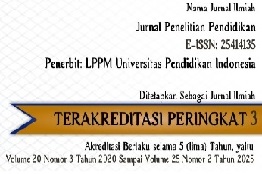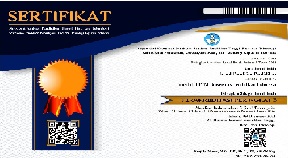The Influence of Industrial Work Practices on Employability Skills of Vocational High School
Abstract
Industrial work practice is one of the efforts made by vocational high schools to produce graduates who have the appropriate skills which field is occupied through practice industrial work students can improve Employability Skills that can improve the quality of self in work. This is to find out the description of the work practice Industrial students of class XII DPIB SMK PU Negeri Bandung, know a description of the work ability of class XII students of DPIB vocational high school, and find out how much influence industrial work practices have on students' Employability Skills class XII DPIB vocational high school The research method used in this research is associative research with a quantitative approach. The population in this study were students of class XII DPIB which collected 69 students, with a research sample of 49 students. The data collection technique uses a questionnaire for both industrial work practices and Employability Skills the results of this study show a general. In general, the general description of the Employability Skills of the XII DPIB class XII students has a tendency of "High Enough", and there is influence Industrial Work Practices on Employability Skills of class XII DPIB students significantly.
Keywords
Full Text:
PDFReferences
Abas, M. C., & Imam, O. A. (2016). Graduates’ Competence on Employability Skills and Job Performance. International Journal of Evaluation and Research in Education (IJERE), 5(2), 119.
Abu Kashef, M., Ginige, A. and Hol, A. (2018), "Framework for enhancing online working-together relations", Journal of Information, Communication and Ethics in Society, Vol. 16 No. 4, pp. 357-380
Dardiri, A. (2015). Kontribusi persepsi siswa tentang kualitas guru, kesesuaian, dan hasil prakerin terhadap employability skills siswa smk. Universitas Stuttgart, 38(2), 121–132.
Donald, W. E., Ashleigh, M. J., & Baruch, Y. (2018). Students’ perceptions of education and employability: Facilitating career transition from higher education into the labor market. Career Development International, 23(5), 513–540.
Ebner, K., Soucek, R., & Selenko, E. (2021). Perceived quality of internships and employability perceptions: the mediating role of career-entry worries. Education and Training, 63(4), 579–596.
Finch, D. J., Hamilton, L. K., Baldwin, R., & Zehner, M. (2013). An exploratory study of factors affecting undergraduate employability. Education and Training, 55(7), 681–704.
Firmansyah, A., Rokhmawati, R. I., & Wicaksono, S. A. (2019). Analisis Faktor Penempatan dan Penentu Keberhasilan Praktik Kerja Lapangan ( PKL ) Menggunakan Metode Kuantitatif Deskriptif ( Studi Pada SMK PGRI 3 Malang ). Jurnal Pengembangan Teknologi Informasi Dan Ilmu Komputer, 3(9), 8506–8513.
Hanapi, Z., Mohd Shariff, M. S., Paijan, A., Mamat, A. B., & Abu Kassim, F. (2018). Indikator Kemahiran Employability dalam Kalangan Graduan Pendidikan. Sains Humanika, 10(3–3), 119–124.
Kim, H. J., Yi, P., & Ko, B. W. (2022). Deepening students’ experiences with problem identification and definition in an empathetic approach: lessons from a university design-thinking program. Journal of Applied Research in Higher Education.
Jones, F. R., Mardis, M. A., McClure, C. R., Ma, J., Ambavarapu, C., & Spears, L. I. (2017). Work-integrated learning (WIL) in information technology: An exploration of employability skills gained from internships. Higher Education, Skills and Work-Based Learning, 7(4), 394–407.
Kapareliotis, I., Voutsina, K., & Patsiotis, A. (2019). Internship and employability prospects: assessing student’s work readiness. Higher Education, Skills and Work-Based Learning, 9(4), 538–549.
Lan, C. C. (2020). Industry instructors’ perspective on internship implementation strategy. Higher Education, Skills and Work-Based Learning, 11(3), 739–756.
Matusovich, H., Carrico, C., Harris, A., Sheppard, S., Brunhaver, S., Streveler, R. and McGlothlin Lester, M.B. (2019), "Internships and engineering: beliefs and behaviors of academics", Education + Training, Vol. 61 No. 6, pp. 650-665.
Munadi, S., Widarto, Yuniarti, N., Jerusalem, M. A., Hermansyah, & Rahmawati, F. (2018). Employability skills lulusan SMK dan relevansinya terhadap kebutuhan dunia kerja. Direktorat Pembinaan Sekolah Menengah Kejuruan
Nanik Susana. (2015). Pengelolaan Praktik Kerja Industri. Manajer Pendidikan, 10(6), 579–587. https://ejournal.unib.ac.id/index.php/manajerpendidikan/article/view/1314
Pusriawan, P., & Soenarto, S. (2019). Employability skills of vocational school students in Palu City for entering the work world. Jurnal Pendidikan Vokasi, 9(1), 33–42.
Sampebua, O., Arfandi, A., & Rappun, M. (2016). Penguatan employability skill melalui praktik kerja industri. Mega Trend Inovasi Dan Kreasi Hasil Penelitian Dalam Menunjang Pembangunan Berkelanjutan, 1–9.
Schraeder, M. (2022), "Guiding new Middle managers in developing effective communication practices", Development and Learning in Organizations, Vol. ahead-of-print No. ahead-of-print.
Situmorang, N. Z., & Dahlan, A. (2019). Faktor–faktor yang mempengaruhi employability. Prosiding Seminar Nasional Magister Psikologi Universitas Ahmad Dahlan, 0(0), 427–432. http://seminar.uad.ac.id/index.php/snmpuad/article/view/3456
Wahyono. (2018). The moderation effect of customer orientation variable on the influence of professional competence toward the quality of strategy implementation. International Journal of Law and Management, 60(6), 1432–1447.
Wahzudik, N. (2018). Kendala dan Rekomendasi Perbaikan Pengembangan Kurikulum di Sekolah Menengah Kejuruan. Indonesian Journal of Curriculum and Educational Technology Studies, 6(2), 87–97.
Wijaya, P. A., & Hariani, B. S. (2015). Upaya Peningkatan Soft Skill Mahasiswa Dalam Menghadapi Dunia Kerja (Studi Kasus Di Jurusan Pendidikan Ips-Ekonomi Fakultas Ilmu Tarbiyah Dan Keguruan Iain Mataram). Society, 6(1), 1–14.
Wiharja MS, H., Rahayu, S., & Rahmiyati, E. (2020). Klasifikasi Gender Berdasarkan Suara Dengan Naive Bayes Dan Mel Frequency Cepstral Coefficient. VOCATECH: Vocational Education and Technology Journal, 2(1), 11–18.
Triyono, M. B., Trianingsih, L., & Nurhadi, D. (2018). Students’ employability skills for construction drawing engineering in Indonesia. World Transactions on Engineering and Technology Education, 16(1), 29–35.
Tsai, M., & Tang, Y. (2017). Learning attitudes and problem- solving attitudes for blended problem-based learning. 35(4), 615–628.
DOI: https://doi.org/10.17509/jpp.v22i3.51029
Refbacks
- There are currently no refbacks.
Copyright (c) 2022 Jurnal Penelitian Pendidikan


